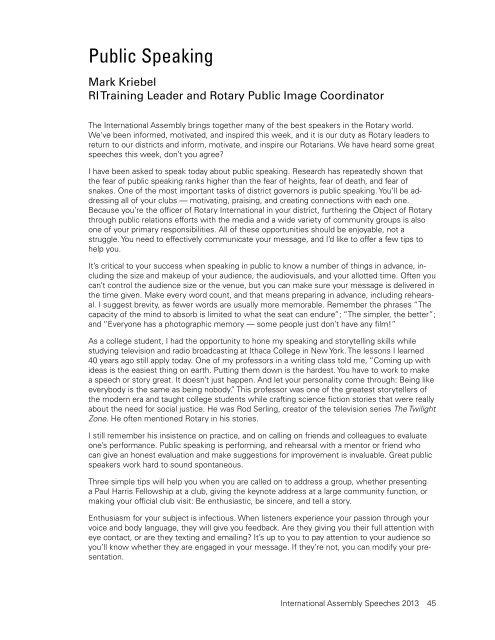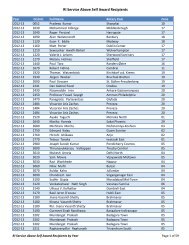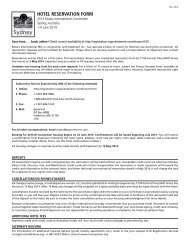DISCURSOS - Rotary International
DISCURSOS - Rotary International
DISCURSOS - Rotary International
Create successful ePaper yourself
Turn your PDF publications into a flip-book with our unique Google optimized e-Paper software.
Public Speaking<br />
Mark Kriebel<br />
RI Training Leader and <strong>Rotary</strong> Public Image Coordinator<br />
The <strong>International</strong> Assembly brings together many of the best speakers in the <strong>Rotary</strong> world.<br />
We’ve been informed, motivated, and inspired this week, and it is our duty as <strong>Rotary</strong> leaders to<br />
return to our districts and inform, motivate, and inspire our Rotarians. We have heard some great<br />
speeches this week, don’t you agree?<br />
I have been asked to speak today about public speaking. Research has repeatedly shown that<br />
the fear of public speaking ranks higher than the fear of heights, fear of death, and fear of<br />
snakes. One of the most important tasks of district governors is public speaking. You’ll be addressing<br />
all of your clubs — motivating, praising, and creating connections with each one.<br />
Because you’re the officer of <strong>Rotary</strong> <strong>International</strong> in your district, furthering the Object of <strong>Rotary</strong><br />
through public relations efforts with the media and a wide variety of community groups is also<br />
one of your primary responsibilities. All of these opportunities should be enjoyable, not a<br />
struggle. You need to effectively communicate your message, and I’d like to offer a few tips to<br />
help you.<br />
It’s critical to your success when speaking in public to know a number of things in advance, including<br />
the size and makeup of your audience, the audiovisuals, and your allotted time. Often you<br />
can’t control the audience size or the venue, but you can make sure your message is delivered in<br />
the time given. Make every word count, and that means preparing in advance, including rehearsal.<br />
I suggest brevity, as fewer words are usually more memorable. Remember the phrases “The<br />
capacity of the mind to absorb is limited to what the seat can endure”; “The simpler, the better”;<br />
and “Everyone has a photographic memory — some people just don’t have any film!”<br />
As a college student, I had the opportunity to hone my speaking and storytelling skills while<br />
studying television and radio broadcasting at Ithaca College in New York. The lessons I learned<br />
40 years ago still apply today. One of my professors in a writing class told me, “Coming up with<br />
ideas is the easiest thing on earth. Putting them down is the hardest. You have to work to make<br />
a speech or story great. It doesn’t just happen. And let your personality come through: Being like<br />
everybody is the same as being nobody.” This professor was one of the greatest storytellers of<br />
the modern era and taught college students while crafting science fiction stories that were really<br />
about the need for social justice. He was Rod Serling, creator of the television series The Twilight<br />
Zone. He often mentioned <strong>Rotary</strong> in his stories.<br />
I still remember his insistence on practice, and on calling on friends and colleagues to evaluate<br />
one’s performance. Public speaking is performing, and rehearsal with a mentor or friend who<br />
can give an honest evaluation and make suggestions for improvement is invaluable. Great public<br />
speakers work hard to sound spontaneous.<br />
Three simple tips will help you when you are called on to address a group, whether presenting<br />
a Paul Harris Fellowship at a club, giving the keynote address at a large community function, or<br />
making your official club visit: Be enthusiastic, be sincere, and tell a story.<br />
Enthusiasm for your subject is infectious. When listeners experience your passion through your<br />
voice and body language, they will give you feedback. Are they giving you their full attention with<br />
eye contact, or are they texting and emailing? It’s up to you to pay attention to your audience so<br />
you’ll know whether they are engaged in your message. If they’re not, you can modify your presentation.<br />
<strong>International</strong> Assembly Speeches 2013 45



![La présidence du club [222-FR] - Rotary International](https://img.yumpu.com/25855726/1/190x245/la-presidence-du-club-222-fr-rotary-international.jpg?quality=85)











![La conférence de district [800-FR] - Rotary International](https://img.yumpu.com/25855636/1/190x245/la-conference-de-district-800-fr-rotary-international.jpg?quality=85)
